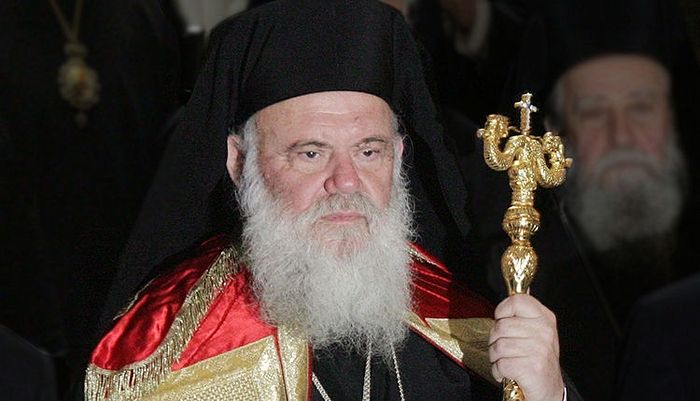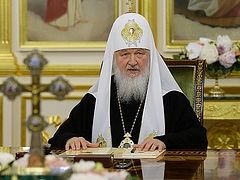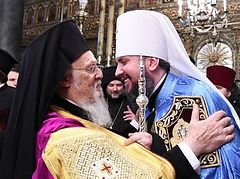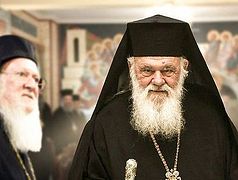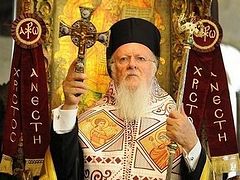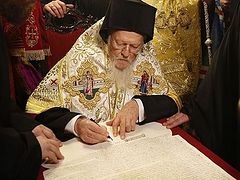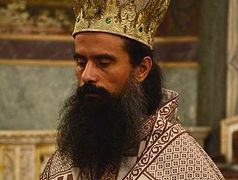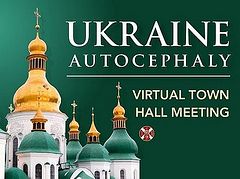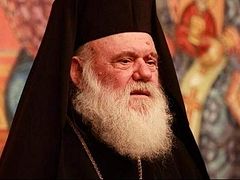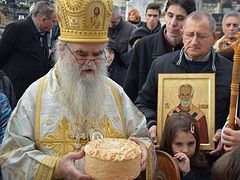Athens, October 14, 2019
The Holy Synod of the Greek Church created two commissions at its March session to examine the Ukrainian issue in depth—on dogmatic and canonical issues, and on inter-Orthodox and inter-Christian relations.
Though media reports on the commissions’ conclusions varied in the intervening months, both bodies concluded that there were no obstacles to the Greek Orthodox Church recognizing the schismatic “Orthodox Church of Ukraine.”
Archbishop Ieronymos, the President of the Holy Synod of the Greek Church, extensively referred to the work of these commissions in his own report and recommendation, which was presented to the hierarchs in an extraordinary session of the Bishops’ Council on Saturday, which resulted in the Greek Church voting to formally recognize the OCU.
The Archbishop’s full report has been published online in Greek, and in Russian by the “Pastor and Flock” Telegram channel, which represents the official magazine of the canonical Ukrainian Orthodox Church.
In his report, Abp. Ieronymos notes that the Holy Synod discussed the Ukrainian issue many times, specifically discussing the commissions’ conclusions on August 28 after they were received by the General Secretariat on August 13. The chairmen of both commissions were present on August 28 and answered all questions posed by the members of the Holy Synod.
The conclusions of both commissions can be reduced to 5 main theses and a conclusion, Abp. Ieronymos writes:
- The Patriarchate of Constantinople never ceded jurisdiction over the Kiev Metropolia to the Russian Orthodox Church, but only granted permission to the Patriarch of Moscow to ordain and enthrone the Metropolitan of Kiev;
The Patriarchate of Constantinople began to push this historical revisionism last summer, though the entire Orthodox world, including Patriarch Bartholomew himself, has accepted the Kiev Metropolia as part of the Russian Church for over 300 years.
In Kiev in July 2008 for the celebration of the 1,020th anniversary of the Baptism of Rus’, Pat. Bartholomew stated: “The Ecumenical Patriarchate's service in the Orthodox Church, at the cost of its own rights, is better exemplified by the development of its relations with the eminent among the daughter Churches, namely the Church of Ukraine, which was under the Ecumenical Patriarchate's canonical jurisdiction for seven centuries, that is, from the baptism of the Grand Duchy of Kiev (988) until her annexation under Peter the Great (1687) to the Russian state.”
- The Patriarchate of Constantinople has the privilege to receive appeals from bishops of other jurisdictions, if the appealing bishop has sent a request;
This is a debatable point, and is not upheld by the great canonist St. Nikodemos the Hagiorite.
- The Patriarch of Constantinople always had and has the indisputable canonical right to care for the Churches in difficult situations, but also the “canonical obligation to promptly take all necessary measures to prevent, eliminate, or heal dangerous threats or temptations for the body of the Church.”
“After all, the entire history of the Ecumenical Patriarchate, whether in times of prosperity or in difficult times, is a real testimony to its service to the suffering Orthodox Churches, always unselfish and sacrificial.”
Again, a very debatable point. See the article, “The Pseudomorphosis of Ottoman Ecclesiology.”
- The Patriarchate of Constantinople has the canonical privilege to independently proclaim the autocephaly of the Local Orthodox Churches (for example, Georgia-1990; Czech Republic-1998, Poland-1924, Albania-1937, Greece-1850, Serbia-1878, Romania-1835, Bulgaria-1945, etc.).
This ignores the fact that the Georgian Church first received its autocephaly from the Antiochian Church in the first millennium. Regarding the Czech-Slovak Church, the Moscow Patriarchate was its Mother Church and granted it autocephaly in 1951—something which the self-sacrificial Patriarchate of Constantinople refused to recognize. After the fall of the Soviet Union, the Czech-Slovak Church sought to normalize its relations with Constantinople, and the Patriarchate decided, to the Czech-Slovak Church’s surprise, to grant it a new tomos of autocephaly that significantly curbed its independence, making it a “slave,” as one hierarch told OrthoChristian.
“Unfortunately, since the Moscow Patriarchate was absent from the meetings of the Council of Crete in 2016, we did not have the opportunity to discuss the issue of autocephaly, and thus missed the chance to come to an agreement with the rest of the Churches,” Abp. Ieronymos writes.
The Archbishop is unfortunately perpetuating false history. The official agenda for the Crete Council was published on January 28, and did not include the topic of autocephaly and how to grant it or any discussion on Ukraine. The Russian Church did not decide until June that it was not attending the Council.
Thus, autocephaly would not have been discussed whether Moscow was there or not. Abp. Ieronymos is completely incorrect.
- According to its constitution, the Greek Church must preserve the sacred Apostolic and conciliar canons and sacred Tradition. It is autocephalous with the Bishops’ Council and the Holy Synod as its governing bodies.
The commissions jointly concluded:
On the basis of the above, having considered the issue of granting autocephaly to the Church of Ukraine not only from the canonical but also from the legal point of view, we report with reverence that there are no obstacles to the recognition of the autocephaly of the Church of Ukraine, as well as for the absolute conformity and common course of the Greek Church with the Ecumenical Patriarchate.
Abp. Ieronymos then recalls that on August 28 the Holy Synod recognized “the canonical right of the Ecumenical Patriarchate to grant autocephaly, as well as the privilege of the primate of the Greek Church to further deal with the issue of the recognition of the Church of Ukraine.”
The administrative organization of the Church has always been aimed at preserving unity and preventing or eliminating heresies or schisms, and the administrative organization has always been conciliar, Abp. Ieronymos writes.
The Great Commission to preach to all the earth demanded the introduction of the canonical institution of autocephaly in all Roman dioceses at the time of the First Ecumenical Council, he writes, which later developed into the system of the Pentarchy, he continues.
Further, “we all know” that all peoples who adopted Christianity “immediately” demanded autocephaly from Constantinople, to strengthen their national unity.
Following the Protestant Reformation, the Enlightenment affected all the newly-create states of the Orthodox peoples from the Ottoman yoke. “This resulted in controversial claims to autocephaly, including ecclesiastical, and withdrawal from the jurisdiction of the Ecumenical Patriarchate,” Abp. Ieronymos writes.
Further: “We all know that the Ecumenical Patriarchate always voluntarily and unselfishly provides autocephaly to the Church of an independent state (if, of course, there are the necessary canonical conditions for this) to meet the urgent and demanding attention of the pastoral needs in a secularized state and in the presence of a successor Orthodox state power. At the same time, Church autocephaly is not granted to those Orthodox peoples who have not yet achieved state independence.”
However, Greece is an independent state, and yet its territory is divided between the Greek Church and the Patriarchate of Constantinople.
And turning to Ukraine, the Greek primate writes that “We all know” that the Church of Ukraine has been subjected to dynastic domination from Poland and Russia for centuries, “but has always remained in its canonical ecclesiastical jurisdiction, in the bosom of the Mother Church, the Ecumenical Patriarchate, since the jurisdiction of the Ecumenical Patriarchate could not be challenged without prejudice to the dominant States.”
In Abp. Ieronymos’ words, the Moscow Patriarchate rejected, “with great indignation,” the “much-needed initiative” of Constantinople to proclaim autocephaly for the OCU.
The Patriarchate of Constantinople has always been a loving Mother to the Church of Ukraine, Abp. Ieronymos writes, never seeking its own gain, but on the contrary, giving up its canonical jurisdiction “so that the numerous Church of Ukraine, including about 40 million Orthodox believers,” cold enter the community of the autocephalous Orthodox Churches.”
The total current population of Ukraine is 43.5 million, thus it cannot be said that the minority OCU has anywhere near 40 million adherents.
In conclusion, Abp. Ieronymos makes a bizarre and naïve statement: “We all know that the proclamation of the autocephaly of the Church of Ukraine is extremely useful for the entire Orthodox Church and will be invaluable for strengthening relations between the two autocephalous Orthodox Churches—the sisters, great Russia and Ukraine.”
“That is why I propose that our Church recognize the autocephaly of the Orthodox Church of the independent Republic of Ukraine,” he finishes.

